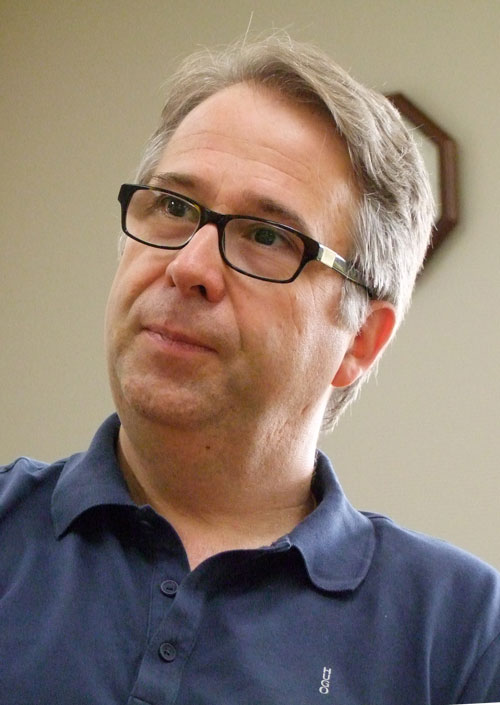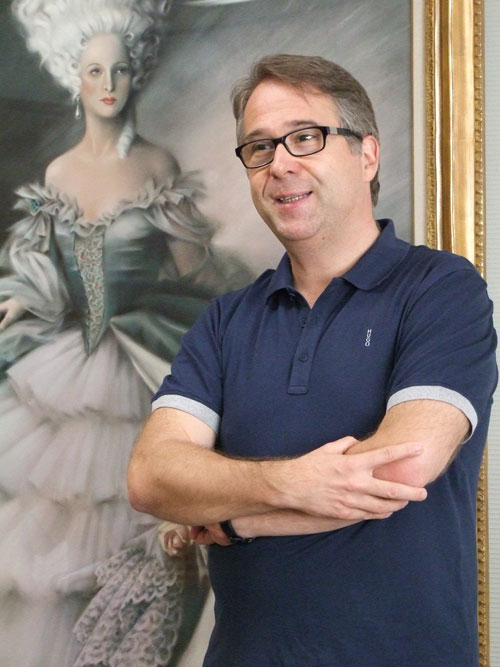INFORMATION DETAIL
Update on Jun 2, 2014, Tue
INTERVIEW | Bertrand de Billy
Even at the age of four, the French conductor Bertrand de Billy knew exactly what he wanted to be when he grew up. “I wanted to become an orchestra conductor,” De Billy says, “I don’t know why.”
Now, internationally acclaimed, De Billy has come to Japan to lead the Tokyo Philharmonic in Richard Strauss’s tragicomedy, Arabella, produced by the New National Theater, Tokyo. He will also conduct R. Strauss’s symphonic poem Ein Heldenleben (Hero’s Life) as well as Beethoven’s Third Symphony, Eroica.

Despite his early leanings, De Billy was not raised as a child prodigy. He describes his childhood as “normal” and “happy.” He did not set his sights on a musical career until he was 14. “I made a late start,” he says. No one in his family shared his love for music except for an elderly relative who died the day he was born. De Billy had to find his own way.
De Billy joined a boys’ choir in Paris and enjoyed singing Bach’s cantatas, and also performed on the stage of the Paris Opera. When Placido Domingo played there as Othello with Margaret Price as Desdemona, De Billy sang as chorister.
A native of Paris, born there in 1965, De Billy went on to study at the Conservatoire National Superieur de Musique de Paris and then started performing as a violinist-cum-violist in local ensembles. All the time he was training himself to be a conductor.
“While playing my instrument in ensemble, I looked at the conductor and analyzed his performance,” he says. “I also went to rehearsals given by Malinowski, Giulini and Abbado, and learned how these great conductors work with orchestra members and how they speak to them and convince them.”
In 1990, De Billy made what he considers his debut when he was asked to stand in for the Swiss conductor Michel Corboz, doing a rehearsal of Verdi’s Requiem with the Orchestre Colonne in Paris. “I never heard Verdi’s Requiem before,” he says. “But it’s my big chance and it’s a test for me. I told myself, ‘Do it.’”
In 1991, when he was working as an assistant to Pierre Dervaux, the chief conductor of the Orchestre Colonne, De Billy made a formal debut as a conductor with Verdi’s La Traviata at the Ovieda Festival in Spain.
Over the past 23 years, De Billy has won acclaim for his rendition of Gounod’s Faust and Puccini’s Turandot at internationally known opera houses, such as the Vienna State Opera and the New York Metropolitan Opera. He also won worldwide popularity for his conducting in Robert Dornhelm’s 2008 film version of Puccini’s La Boheme, featuring Anna Netrebko and Rolando Villazon.
De Billy credits his success to Placido Domingo, who saw him directing Thomas’s opera Hamlet at the Vienna Volksoper in 1993 and then invited him to direct French operas at American opera houses. “He is a great actor, singer and musician. He has got something special, like an aura,” De Billy says of Domingo. “He helped me a lot.”
In 2002, De Billy took up the post of principal conductor of the Vienna Radio Symphony Orchestra. “I wanted to balance between opera and orchestral works,” he explains. During his tenure in Vienna, he made a successful recording of the works of Beethoven, Strauss and Debussy. In 2007 and 2008, he led Vienna orchestra on a tour of Japan, performing such works as Beethoven’s, Eroica, and Debussy’s symphonic poem, La Mer.

During that first tour of Japan, De Billy says, “I was surprised that the moment I stood on the podium at a concert hall and bowed to the audience, an awesome silence fell. In Europe, I’ve got to wait for the noise and coughing to stop.”
On this trip to Japan, he was surprised and pleased with the performance of the Philharmonic musicians. “The musicians of the Tokyo Philharmonic are well disciplined and work as one body so that they make much progress in rehearsal,’’ says De Billy. “I am also amazed that they are technically superb. After the first practice of Strauss’s Arabella, they created Strauss’s special Viennese sound.”
When De Billy rehearses the Philharmonic in Hero’s Life, Strauss’s musical autobiography in six parts, which highlights a parody of music critics and the composer’s desire for a peaceful death, he says he will lead the musicians to “create the lyrical chamber music sound,” necessary for the well-detailed and well-nuanced portrayal of the hero’s life. Strauss uses 30 citations, taken from his earlier works, including “Guntram, Don Juan and Till Eulenspiegels lustige Streiche,” De Billy says. “Hero’s Life is a brilliant resume.”
Beethoven’s Eroica, written in 1804, nearly a century before Strauss’s work, is “a revolutionary piece,” De Billy says. “It is a long symphony. But the first movement opens fast, like Strauss’s Arabella, which doesn’t have an overture and produces discordant sounds, which nobody might have heard in the early 19th century.”
The second movement is “unbelievable,” De Billy says, capturing the peaceful moment of acceptance or resignation of the dying man. “My mother fought against her pulmonary disease for a long time. But, a minute before she died, she had a revelation that the time has come and said, ‘I can’t go on living any longer.’ And then, grew quiet.” In Eroica, De Billy says, Beethoven conveys such complex, delicate emotional moment in a very simple form but that very simplicity makes Eroica a challenging in performance.
There will be no moment of rest for De Billy following the Tokyo concert. He will be at the Royal Opera House in London in July, directing Donizetti’s Maria Stuarda. He also will record works of Cherubini, and in the coming season, he will serve as chief conductor of the Orchestre de Chambre de Lausanne in Switzerland.










![BUY TPO TICKETS [03-5353-9522] Business hours: 10:00~18:00 Regular holiday: Sat・Sun・Holiday](../../img/common_en/bnr_inquiry2.png)
